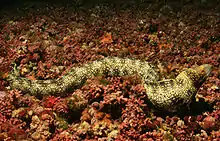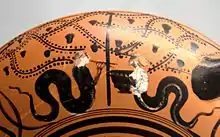Echidna
Translingual
Etymology
From Ancient Greek Ἔχιδνα (Ékhidna, “Echidna”), from ἔχιδνα (ékhidna, “viper”).
Hypernyms
- (genus): Eukaryota – superkingdom; Animalia – kingdom; Bilateria – subkingdom; Deuterostomia – infrakingdom; Chordata – phylum; Vertebrata – subphylum; Gnathostomata – infraphylum; Actinopterygii – superclass; Teleostei – class; Elopomorpha - superorder; Anguilliformes - order; Anguilloidei - suborder; Muraenidae - family
Hyponyms
- (genus): Echidna nebulosa (snowflake moray) - type species; Echidna amblyodon, Echidna catenata (chain moray), Echidna delicatula, Echidna leucotaenia, Echidna nocturna, Echidna peli, Echidna polyzona, Echidna rhodochilus, Echidna unicolor (unicolor moray), Echidna xanthospilos - other species
References
 Echidna (genus) on Wikipedia.Wikipedia
Echidna (genus) on Wikipedia.Wikipedia  Echidna on Wikispecies.Wikispecies
Echidna on Wikispecies.Wikispecies  Echidna on Wikimedia Commons.Wikimedia Commons
Echidna on Wikimedia Commons.Wikimedia Commons
English
Etymology
From Ancient Greek Ἔχιδνα (Ékhidna, “Echidna”), from ἔχιδνα (ékhidna, “viper”).
Pronunciation
- IPA(key): /ɪˈkɪd.nə/, /əˈkɪd.nə/
Proper noun
Echidna
- (Greek mythology) A female monster who, along with Typhon, mothered the vast majority of the famous monsters and creatures of Greek mythology.
- 1596, Edmund Spenser, “Book V, Canto XI”, in The Faerie Queene. […], London: […] [John Wolfe] for William Ponsonbie, →OCLC:
- Horrible, hideous, and of hellish race, / Borne of the brooding of Echidna base, / Or other like infernall furies kinde […].
Translations
Anagrams
This article is issued from Wiktionary. The text is licensed under Creative Commons - Attribution - Sharealike. Additional terms may apply for the media files.

